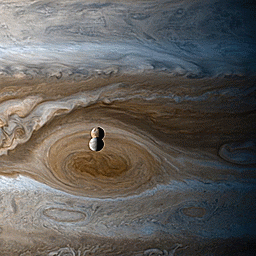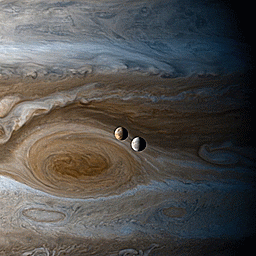The Kepler Space Telescope Has Shown Us Our Galaxy Is Teeming With Planets — And Other Surprises
The Kepler space telescope has shown us our galaxy is teeming with planets — and other surprises

The Kepler space telescope has taught us there are so many planets out there, they outnumber even the stars. Here is a sample of these wondrous, weird and unexpected worlds (and other spectacular objects in space) that Kepler has spotted with its “eye” opened to the heavens.
Kepler has found that double sunsets really do exist.

Yes, Star Wars fans, the double sunset on Tatooine could really exist. Kepler discovered the first known planet around a double-star system, though Kepler-16b is probably a gas giant without a solid surface.
Kepler has gotten us closer to finding planets like Earth.

Nope. Kepler hasn’t found Earth 2.0, and that wasn’t the job it set out to do. But in its survey of hundreds of thousands of stars, Kepler found planets near in size to Earth orbiting at a distance where liquid water could pool on the surface. One of them, Kepler-62f, is about 40 percent bigger than Earth and is likely rocky. Is there life on any of them? We still have a lot more to learn.
This sizzling world is so hot iron would melt!

One of Kepler’s early discoveries was the small, scorched world of Kepler-10b. With a year that lasts less than an Earth day and density high enough to imply it’s probably made of iron and rock, this “lava world” gave us the first solid evidence of a rocky planet outside our solar system.
If it’s not an alien megastructure, what is this oddly fluctuating star?

When Kepler detected the oddly fluctuating light from “Tabby’s Star,” the internet lit up with speculation of an alien megastructure. Astronomers have concluded it’s probably an orbiting dust cloud.
Kepler caught this dead star cannibalizing its planet.

What happens when a solar system dies? Kepler discovered a white dwarf, the compact corpse of a star in the process of vaporizing a planet.
These Kepler planets are more than twice the age of our Sun!

The five small planets in Kepler-444 were born 11 billion years ago when our galaxy was in its youth. Imagine what these ancient planets look like after all that time?
Kepler found a supernova exploding at breakneck speed.

This premier planet hunter has also been watching stars explode. Kepler recorded a sped-up version of a supernova called a “fast-evolving luminescent transit” that reached its peak brightness at breakneck speed. It was caused by a star spewing out a dense shell of gas that lit up when hit with the shockwave from the blast.
* All images are artist illustrations.
Make sure to follow us on Tumblr for your regular dose of space: http://nasa.tumblr.com
More Posts from Ocrim1967 and Others



Created using still images taken by the Cassini spacecraft during it’s flyby of Jupiter and while at Saturn. Shown is Io and Europa over Jupiter’s Great Red Spot.
NASA/JPL-Caltech/SSI/CICLOPS/Kevin M. Gill


Gif by Satiricon


The year is 1965, and thanks to telecommunication engineers at our Jet Propulsions Laboratory, the first color version of one of our first Martian images had been created. Brought to life by hand coloring numbered strips, this image is a true blast to the past.
Fast forward to the 21st century and our Mars InSight mission now enables us to gawk at the Martian horizon as if we were there. InSight captured this panorama of its landing site on Dec. 9, 2018, the 14th Martian day, or sol, of its mission. The 290-degree perspective surveys the rim of the degraded crater InSight landed in and was made up of 30 photos stitched together.
Make sure to follow us on Tumblr for your regular dose of space: http://nasa.tumblr.com.
Our Favorite Valentines Throughout the Universe
Today is Valentine’s Day. What better way to express that you love someone than with an intergalactic love gram? Check out some of our favorites and send them to all of your cosmic companions:
Your love is galactic

The Hubble Space Telescope revolutionized nearly all areas of astronomical research — and captured some truly lovely images. Here, a pair of intersecting galaxies swirl into the shape of a rose as a result of gravitational tidal pull. What type of roses are you getting for your love — red or galactic?
I think you’re n{ice}

IceBridge is the largest airborne survey of Earth’s polar ice ever flown. It captures 3-D views of Arctic and Antarctic ice sheets, ice shelves and sea ice. This lovely heart-shaped glacier feature was discovered in northwest Greenland during an IceBridge flight in 2017. Which of your lover’s features would you say are the coolest?
You’re absolutely magnetic

Even though we can’t see them, magnetic fields are all around us. One of the solar system’s largest magnetospheres belongs to Jupiter. Right now, our Juno spacecraft is providing scientists with their first glimpses of this unseen force. Is your attraction to your loved one magnetic?
You’re MARS-velous

This heart-shaped feature on the Martian landscape was captured by our Mars Reconnaissance Orbiter. It was created by a small impact crater that blew darker material on the surface away. What impact has your loved one had on you?
I <3 you

From three billion miles away, Pluto sent a “love note” back to Earth, via our New Horizons spacecraft. This stunning image of Pluto’s “heart” shows one of the world’s most dominant features, estimated to be 1,000 miles (1,600 km) across at its widest point. Will you pass this love note on to someone special in your life?
Light of my life

Our Solar Dynamics Observatory keeps an eye on our closest star that brings energy to you and your love. The observatory helps us understand where the Sun’s energy comes from, how the inside of the Sun works, how energy is stored and released in the Sun’s atmosphere and much more. Who would you say is your ray of sunshine?
Do any of these cosmic phenomena remind you of someone in your universe? Download these cards here to send to all the stars in your sky.
Want something from the Red Planet to match your bouquet of red roses? Here is our collection of Martian Valentines.
Make sure to follow us on Tumblr for your regular dose of space: http://nasa.tumblr.com


Chandra Spots Extremely Long Cosmic Jet in Early Universe
http://www.sci-news.com/astronomy/chandra-extremely-long-cosmic-jet-early-universe-09436.html










FOR SALE: Mobile &Web Illustration





Loving Vincent (2017) dir. Dorota Kobiela, Hugh Welchman










(Source)
Hilarious Animal Snapchats That Are Impossible Not To Laugh At




















-
 cultivatingcalm liked this · 6 months ago
cultivatingcalm liked this · 6 months ago -
 anna2zkb7 liked this · 7 months ago
anna2zkb7 liked this · 7 months ago -
 last-starborn reblogged this · 9 months ago
last-starborn reblogged this · 9 months ago -
 sporadicshepherdfriendbear liked this · 10 months ago
sporadicshepherdfriendbear liked this · 10 months ago -
 archived-babydoll1bb reblogged this · 1 year ago
archived-babydoll1bb reblogged this · 1 year ago -
 madebymaryssa liked this · 1 year ago
madebymaryssa liked this · 1 year ago -
 quidittch liked this · 1 year ago
quidittch liked this · 1 year ago -
 scherzyhamilton liked this · 1 year ago
scherzyhamilton liked this · 1 year ago -
 necningderhighbers liked this · 1 year ago
necningderhighbers liked this · 1 year ago -
 patloika liked this · 1 year ago
patloika liked this · 1 year ago -
 dcwneyjr liked this · 1 year ago
dcwneyjr liked this · 1 year ago